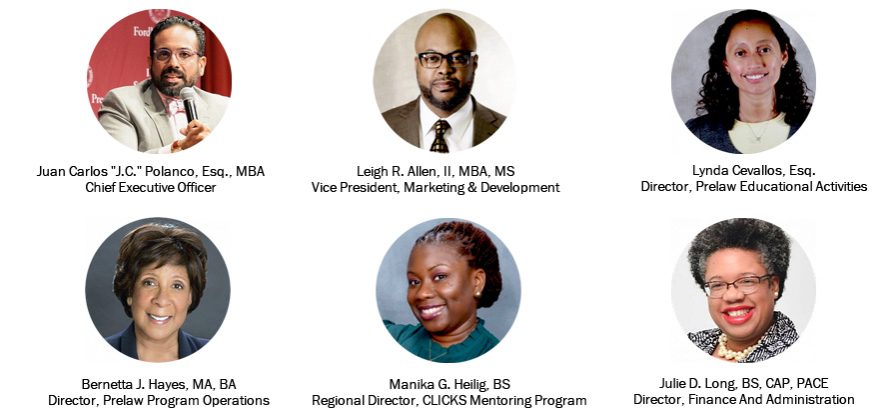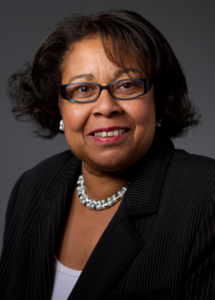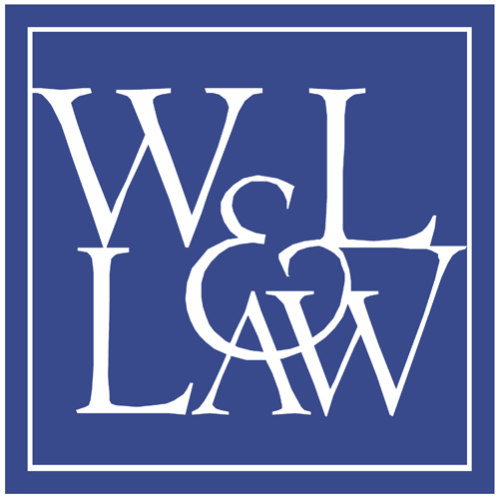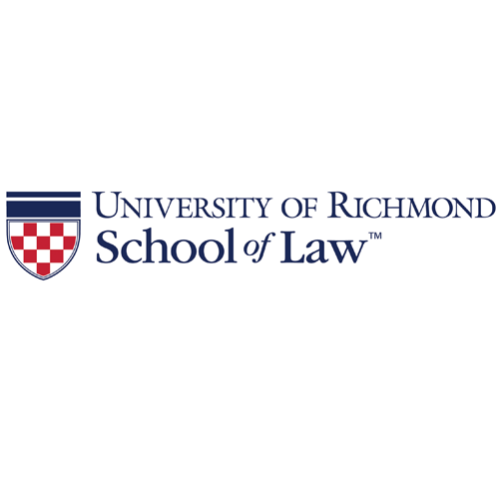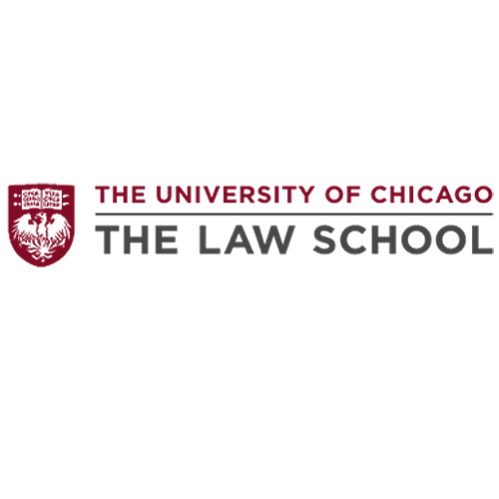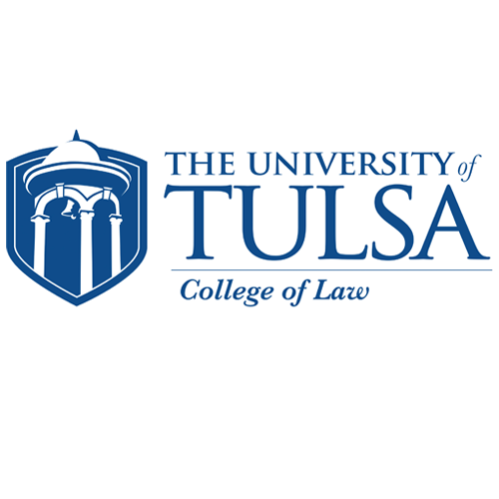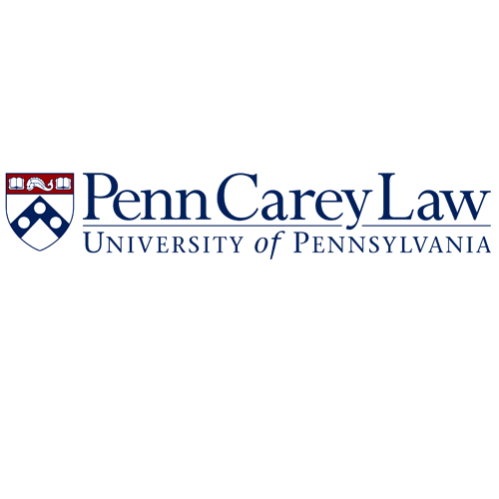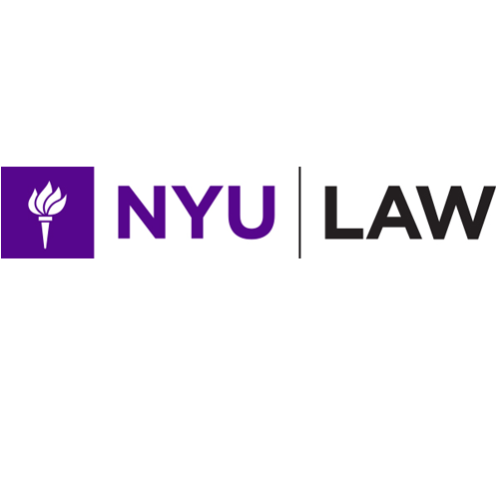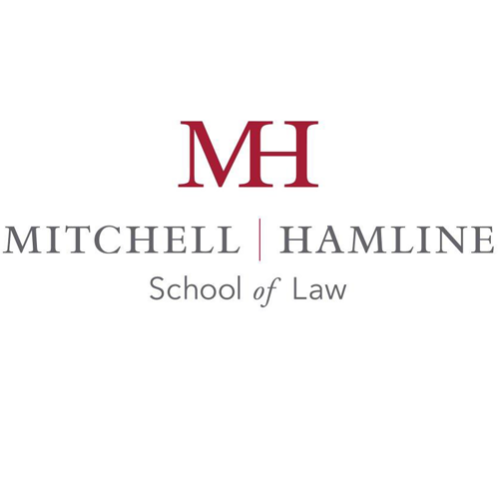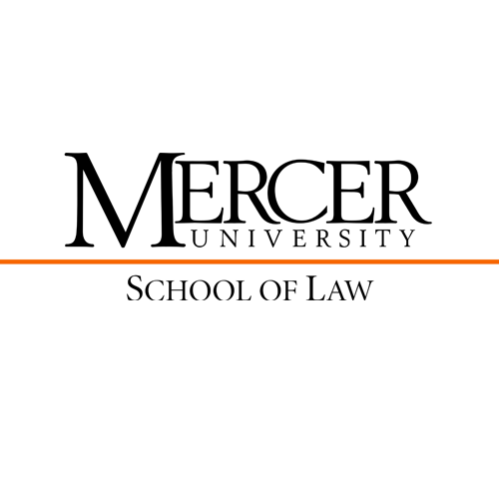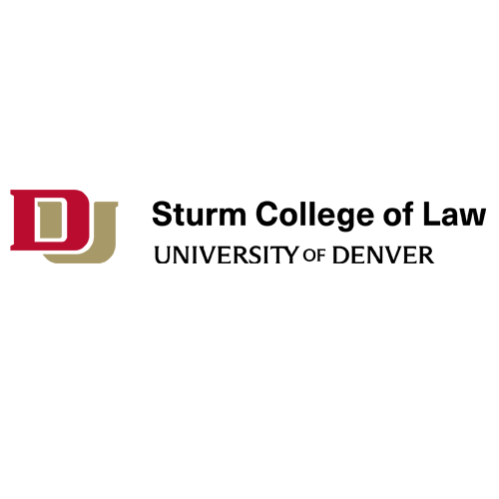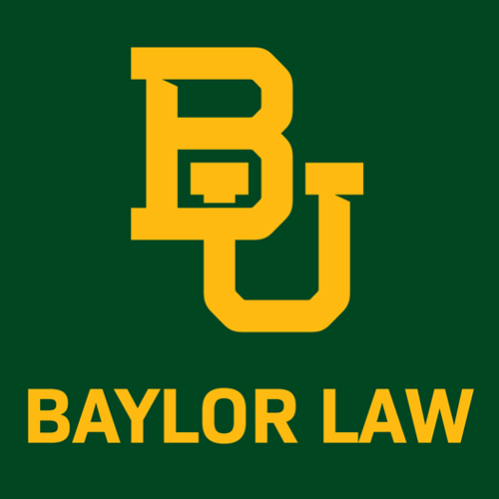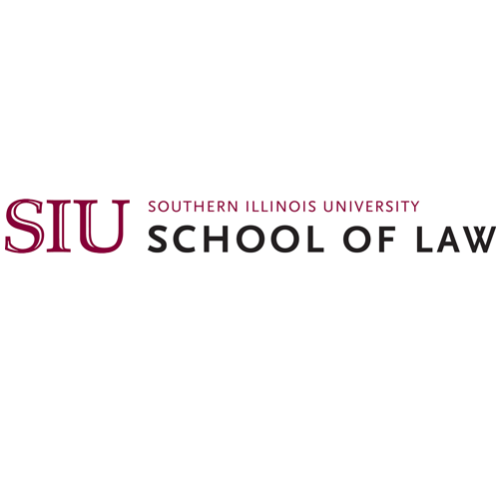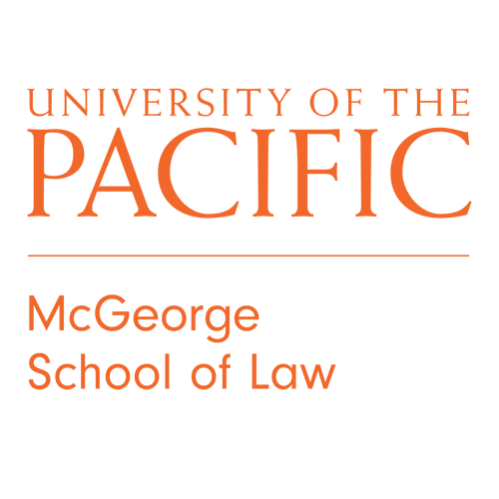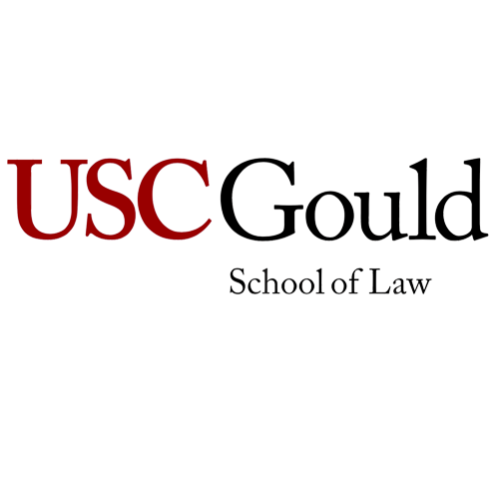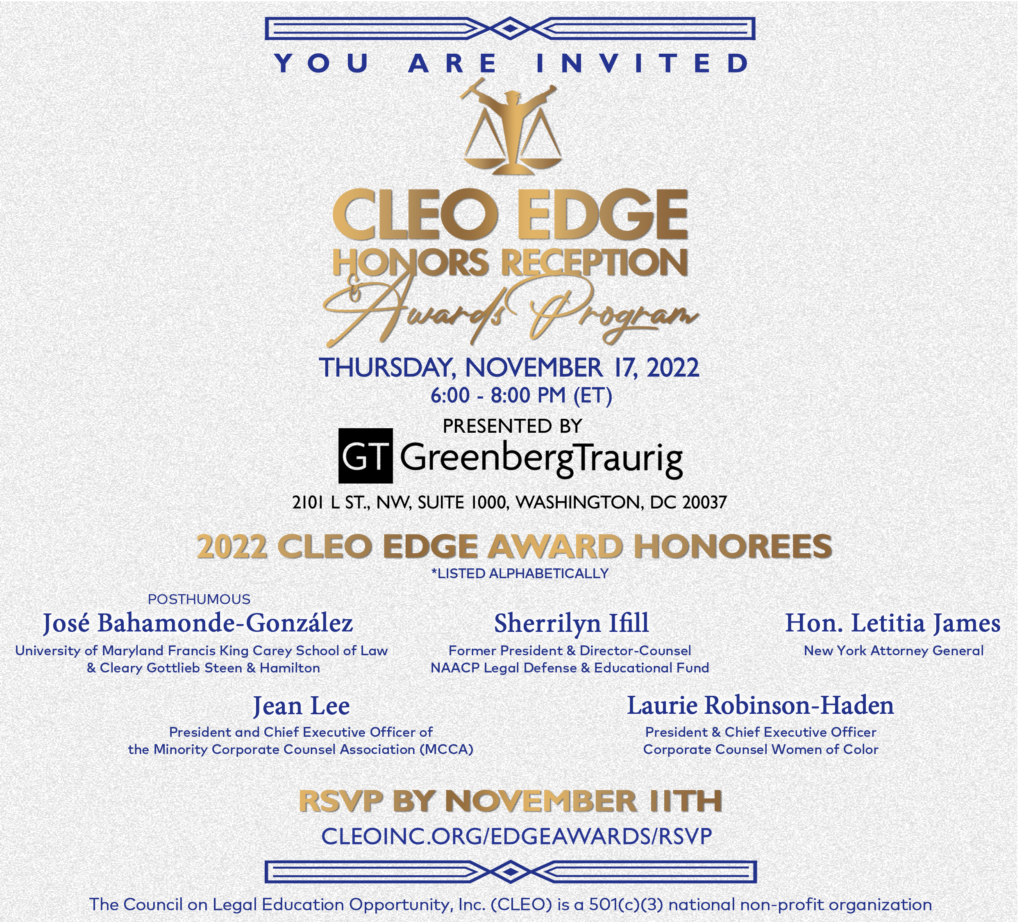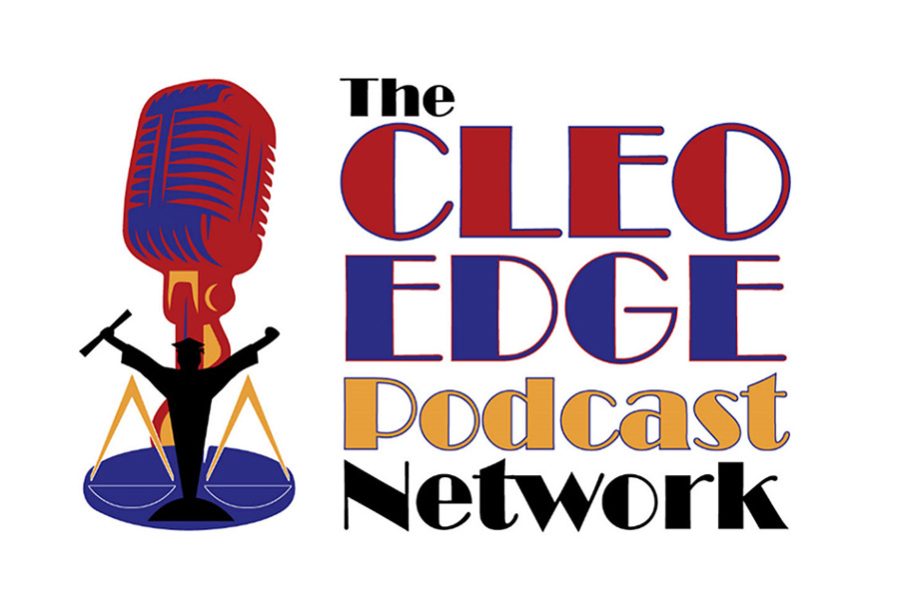
November, 2022 – Issue 7
Welcome to The Council on Legal Education Opportunity, Inc. (CLEO) JD Report. We will share tips on how to prepare for and succeed in law school, get legal profession insights from our CLEO alumni, and get to know our Partners-In-Law – law schools that are making a commitment to diversity and inclusion.
CLEO Staff
The Council on Legal Education Opportunity, Inc. (CLEO): is a 501(c)(3) national non-profit organization that was founded in 1968 to expand opportunities for minority and low-income students to attend law school. Since its inception, more than 30,000 students have participated in CLEO’s programs and joined the legal profession.

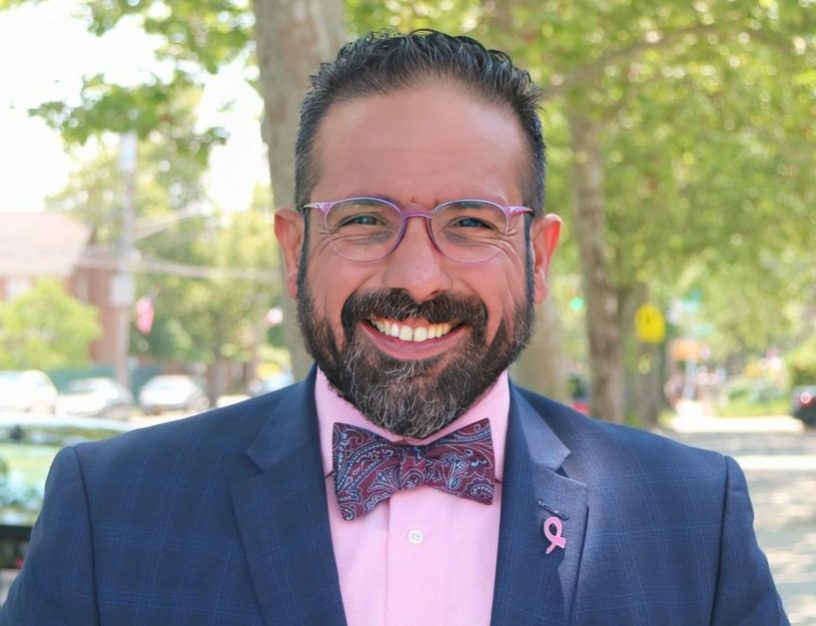
Being part of CLEO is a once-in-a-lifetime opportunity for me. I’m so excited to lead an incredible team of change agents who are laser-focused on truly making law school a reality for students hungry for success. Many of the students we serve are from places like the ones I grew up in. Places where we have never met an attorney or anyone who has gone to law school. Perhaps the costs were too great, or you didn’t have the encouragement mentorship so many yearn for as they pursue their dreams of becoming attorneys.
For 54 years, CLEO has been at the forefront of filling this void: Being the most important diversity pipeline for law schools in the country. Next year will be our Emerald Anniversary and we have so many plans for an exciting and productive year where we will work diligently to increase enrollment of diverse groups in law schools nationwide.
Join us as we shatter barriers in our legal system. Participate in our programs, promote CLEO to law school hopefuls and consider donating to our cause. Together, we can make a real difference in our country.
Juan Carlos Polanco, Esq., MBA
Chief Executive Officer

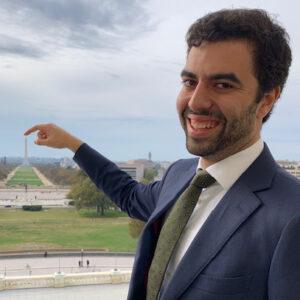
Read Secrets of a Law Student’s success & how CLEO can help YOU!
Camilo Rivera Vacirca -2L
Columbia Law School (class of 2024)
New York, NY
Q1. What was your course of study in college?
Political Science & History – Columbia University, Columbia College
Q2. How did you become interested in pursuing law?
I had the opportunity to work with my dad on immigration asylum cases and a worker’s compensation case for a noncitizen during my summer in college. I realized two important things from the job; first, I realized that the type of skills needed for litigation work are skills that I already possessed. Public speaking, research and persuasive writing, ability to present your work in a stressful environment. Second, I realized that this type of work has a high positive-impact on people’s lives. I thought to myself ‘I like the work, I think I can do great in this line of work, and I can have a positive impact on the lives’ of others; I should go to law school.’
As simple as these realizations are, I think it is critical that you know, for certain, that this is what you want to do, and you’ll be happy doing it. Having a career as an attorney, from my limited perspective, is not for those who pursue it as a Plan B career.
Q3. What steps did you take to prepare for law school?
I took CLEO’s summer 1L prep course so I could hit the ground running, understanding how to read caselaw and how to apply what I read to a given set of facts. It was very helpful, but you are not graded on how well you know the material, you are graded on how well you know the material relative to your peers.
If you go to a great law school, I think you should mentally prepare for the rigor and the type of students that will come with it. However, if you go to a great law school, I do not think you should waste time worrying about what other students do or do not do. You’re already in, there are countless fancy big law firms that will hire you, and they all pay the same.
Relax, rest, and be excited about learning the law. The law is a powerful tool, and for me, every aspect of the law is thrilling to learn about.
Q4. How did you find out about CLEO?
My dad did a CLEO prep course around the time the organization started, [about 50 years ago!]. He told me he thought the prep was helpful and encouraged me to take the course as well.
Q5. What benefits did you receive by participating in the CLEO Pre-Law Summer Institute or 1L-Prep Attitude is Essential?
To a person who has not gone to law school, explaining the law can be difficult. Your first semester is going to be the worst as you learn how to read these cases and learn what exactly you are looking for. The few days that I participated in the CLEO 1L prep course, I was able to read a few cases, practice identifying the rules created from the case, and then apply those rules to a given set of facts. This is law school to the core. You are going to read hundreds of cases, but each next case is easier to read than the last. The initial exposure CLEO offered helped set my brain in the right direction as I learned through my 1L year how to read and apply caselaw.
Q6. What helped you cope with the stress of law school?
My running joke when 3Ls ask me how 2L is going “you know, I did not think law school could take away more of my life and hobbies, but law school continues to surprise me.” Laughter and head nods soon follow.
I really enjoyed my life before law school. I did not think about nor do work on the weekends, I had a job that paid me, I cooked my lunches and dinners almost every day, I ran and worked out almost every day, I hung out with my friends, and I regularly lived the bachelor lifestyle any 20-something city-slicker can live.
All that changes in law school. You will work on your weekends, you will not have the time for all of your hobbies, and you will be stressed. I have rarely, if ever, said ‘no’ to a friend who wants to hang out till law school.
I think what is most important is to figure out one or two core things you love to do in your free time. Painting, exercise, blogging, whatever hobby you really like, maintain that through law school.
I also think giving yourself hard no-work times is also important. Some that I heard from other students here and that I implemented were things like: do not work past midnight, go out with your friends/have a weekend night once a weekend.
Q7. After law school, what are your legal career plans?
For my 2L summer, I will work as a summer associate at Kasowitz, Benson, Torres in New York. If all goes well, I plan to return, hopefully working as a securities or commercial litigation attorney (though most people drift towards litigation generalist for the first few years).
Q8. Do you volunteer or intern with any legal organizations?
For my 1L summer, I interned in the Chambers of the Honorable Joseph Greenaway Jr., U.S. Court of Appeals for the Third Circuit. If you are interested in public policy work, you will come to understand how important judges are and how beneficial it is to learn how decisions are made and how disputes over the law or facts are decided. The work also gives you the opportunity to compare and contrast briefs. This is important because if you want to be a litigation attorney, brief writing is critical to how a decision is reached. You can learn what kinds of things work well and don’t work in a brief.
Q9. Do you have any advice for future lawyers?
85.9% of lawyers in the United States are White as of 2020 according to the American Bar Association. Roughly 80% of sitting judges are White. Hispanic/Latino lawyers make-up 4.6% of the profession, up from 3.7% a decade ago. African-American lawyers make-up 4.7%, down from 4.8% a decade ago. (https://www.2civility.org/aba-profile-of-the-legal-profession-diversity-and-well-being/)
If you want to see change in America, you must be the agent of that change. Nobody else is going to do it but you.
Q10. What motivates you to be part of the legal profession?
The power and the ability to create positive and long-lasting change in my community and the communities around me.

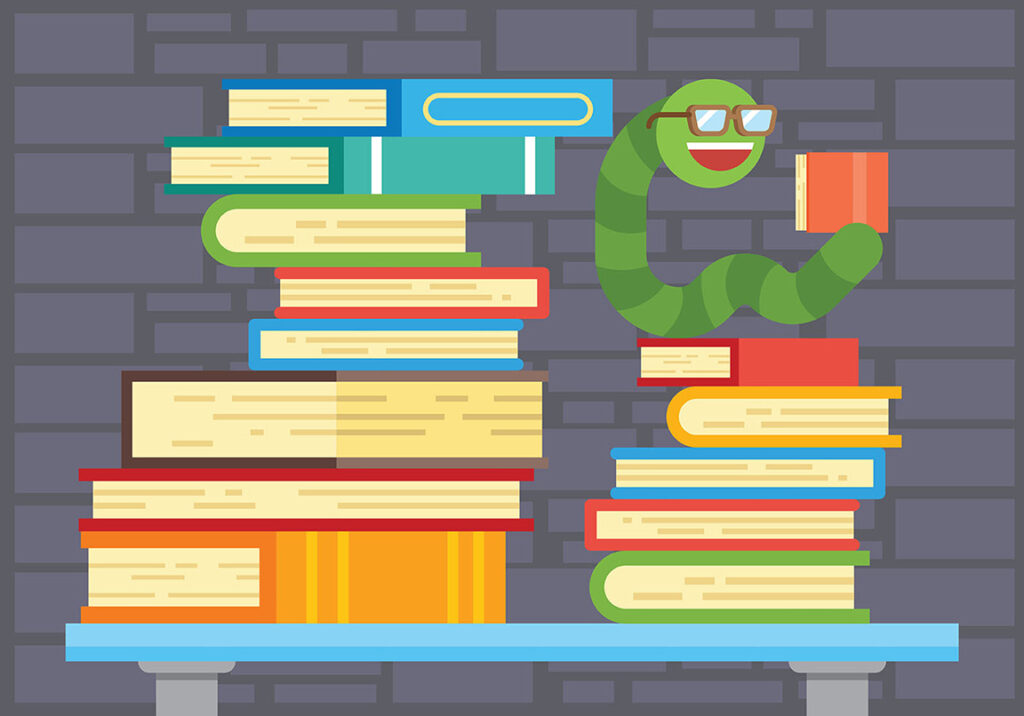
One Saturday evening, eight friends – Aliyah, Benito, Cassie, Dorian, Ellery, Fern, Gaya, and Helmut – decide to visit the theater to see one of the four latest blockbuster movies. Exactly one of the friends decides to see Ninja Unicorns. Two of the friends see Revengers XXII. Two of the friends see Live Action Remake. And three of the friends see The Slow and the Sympathetic.
From the clues listed below, can you determine which movie each friend sees?
Aliyah and Benito see the same movie. Fern sees the same movie as Gaya.
Cassie does not see the same movie as Dorian. Dorian does not see the same movie as Ellery. Ellery does not see the same movie as Cassie.
Cassie does not see a movie alone nor does she see a movie with Fran or Helmut.
Helmut does not see Revengers XXII. Dorian does not see Live Action Remake.
Solution: Ninja Unicorns is seen by Dorian. Revengers XXII is seen by Fern and Gaya. Live Action Remake is seen by Ellery and Helmut. The Slow and the Sympathetic is seen by Aliyah, Benito, and Cassie.

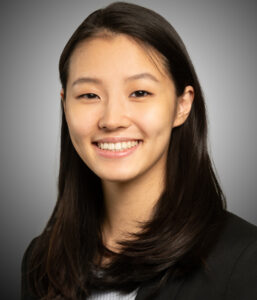
Read Secrets of a Pre-Law Student’s success & how CLEO can help YOU!
Grace Kwon
Northern Virginia Community College (A.S.)
Cornell University – (expected May 2024)
Q1. How did you find out about CLEO?
I found out about CLEO through my community college’s weekly newsletter.
Q2. When did you realize you wanted to attend law school?
While I always had some interest in law from my personal experiences with the U.S. healthcare and immigration system, attending a CLEO program helped me solidify that decision. I became better informed of all that was required for law schools and the expectations.
Q3. What did you learn during the CLEO program you attended?
CLEO programs have given me a solid base to work off of. I have learned about the law school admission process from deans and law students. I’ve participated in the College Scholars Program where I experienced mock law classes and got a glimpse of what law school classes would look like. I learned about the versatile career in law options and how I can approach those different paths.
Q4. How has the CLEO programs influenced your preparation for law school?
The programs have helped me understand what path works best for me and how I can stay consistent in this long-term journey. I’ve also gotten a better understanding of the logistics of law school such as what is best fit for me and how to finance my legal education.
Q5. Select one of the CLEO programs (ASAP, JJ LSAT or CLEO Connection) you attended. What portion of that program was most beneficial to you and why?
During the CLEO ASAP program, I sat in on a law student panel that was very insightful. The law students shared personal experiences of their first few years of law school. Understanding various perspectives outside of the technical aspects of law school was helpful. Addressing topics such as school and life balance as well as mental health was eye opening.
Q6. Do you plan to attend any future CLEO events?
Yes, I do! I plan to attend more CLEO Connection sessions and Juniors Jumpstart LSAT.
Q7. Do you have any advice for other aspiring lawyers?
Don’t be afraid to pursue what you want. Look for resources and a community like CLEO to support you through this journey!
Q8. Do you have any additional comments about CLEO?
I’m incredibly grateful for all that CLEO has done for me. It really bridged the gap between my interests and the resources I will need to succeed. What I thought was a possibility, has become a reality through CLEO programs.

Meet a dynamic young Scholar & listen to his secrets of success!
Asante Brooks - High School Freshman
Coral Glades High School, Coral Springs, Florida

Monique E. Liburd - CLEO PLSI Alumna (2005)
The CLEO “Alumni Spotlight” showcases CLEO alumni and the experience and success they’ve had in the legal profession. It also represents a space to highlight community involvement, volunteer service, and the impact CLEO alumni are making in society. If interested in being considered for an upcoming “Alumni Spotlight,” please send an email to alumni@cleoinc.org.

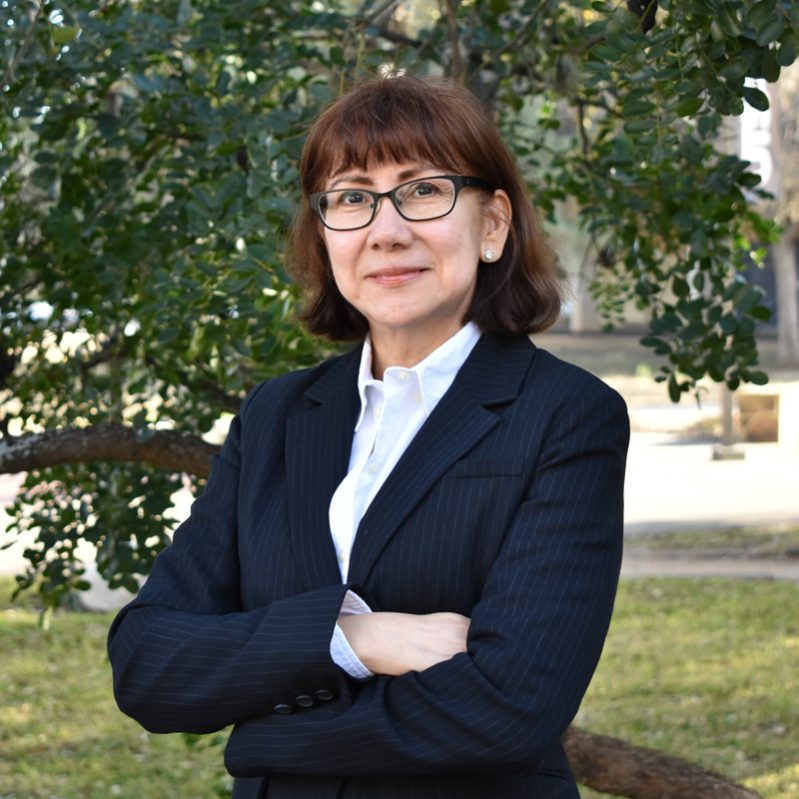
Impact of Pandemic on Pre-Law Students, Reflections of a Pre-Law Advisor
by Dr. Ana Alvarez,
Program Manager, University Pre-Law Advisor
The University of Texas at San Antonio
When the whole world was forced by the pandemic to change our normal daily routines, we all had to learn to pivot. Higher education institutions had to rapidly adapt to the demands posed by the pandemic. Online learning and virtual communication took a prominent place, and with it, Pre-Law advising adapted to respond to the repercussions of the pandemic for our law school hopefuls.
There were several positive outcomes for Pre-Law students resulting from the pandemic.
Pre-Law advising was more accessible. Students had the opportunity to virtually meet with their Pre-Law advisor more often and for longer periods of time. Quality communication was increased. Some students also dedicated more time to prepare for the LSAT -and, in general terms, achieved higher scores. Additionally, Pre-Law students were encouraged to find alternative ways to get a well-rounded education. Some students were able to find virtual internships, -although not always in a legal field, – dedicate time to conduct research on topics of interest and get published, and find more volunteer opportunities to do good things for the community. The pandemic made students realize of the needs of the less fortunate, and they grew a sense of community. These challenging times also highlighted social inequalities among diverse groups, which motivated students to pursue a legal education as a way to enhance the justice system and advocate for those who need the most help. They realized legal solutions were required.
Unfortunately, the pandemic also brought negative implications for Pre-Law students. Those of low-income household struggled with adapting to online courses – perhaps because they did not have access to home broadband services or did not own a tablet, desktop, or laptop that would enable them to go online. They were affected with lower grades or course dropping. Alternatively, because the magic of in-person interaction did not occur, students developed attachment to the use of cell phones, computers, or other devices, decreasing the quality of verbal and formal written communication, essential for law school -and the legal career. Additionally, difficult circumstances such as adapting quickly to an online learning environment, losing a job -and with it, reducing or eliminating income, – or just the sense of isolation, were difficult situations to cope with. Students were impacted on their emotional, psychological, and social well-being, affecting their mental health.
Now that more vaccines are available and we are back on campus, we are learning to cope with the new normal. We are not getting back to the pre-pandemic era. Hybrid formats will continue being offered as institutions have changed their calendars to support students. Students can take in-person classes, but online courses are not gone away, nor will they. Events are held in-person and virtually. More mental health services are available. Although Pre-Law students are struggling with their communication skills, it is time to adapt again.
The pandemic has allowed our Pre-Law students to be resilient and inspired them to think about ways to take on a personalized initiative that can set them apart to succeed on their path towards law school and legal career.

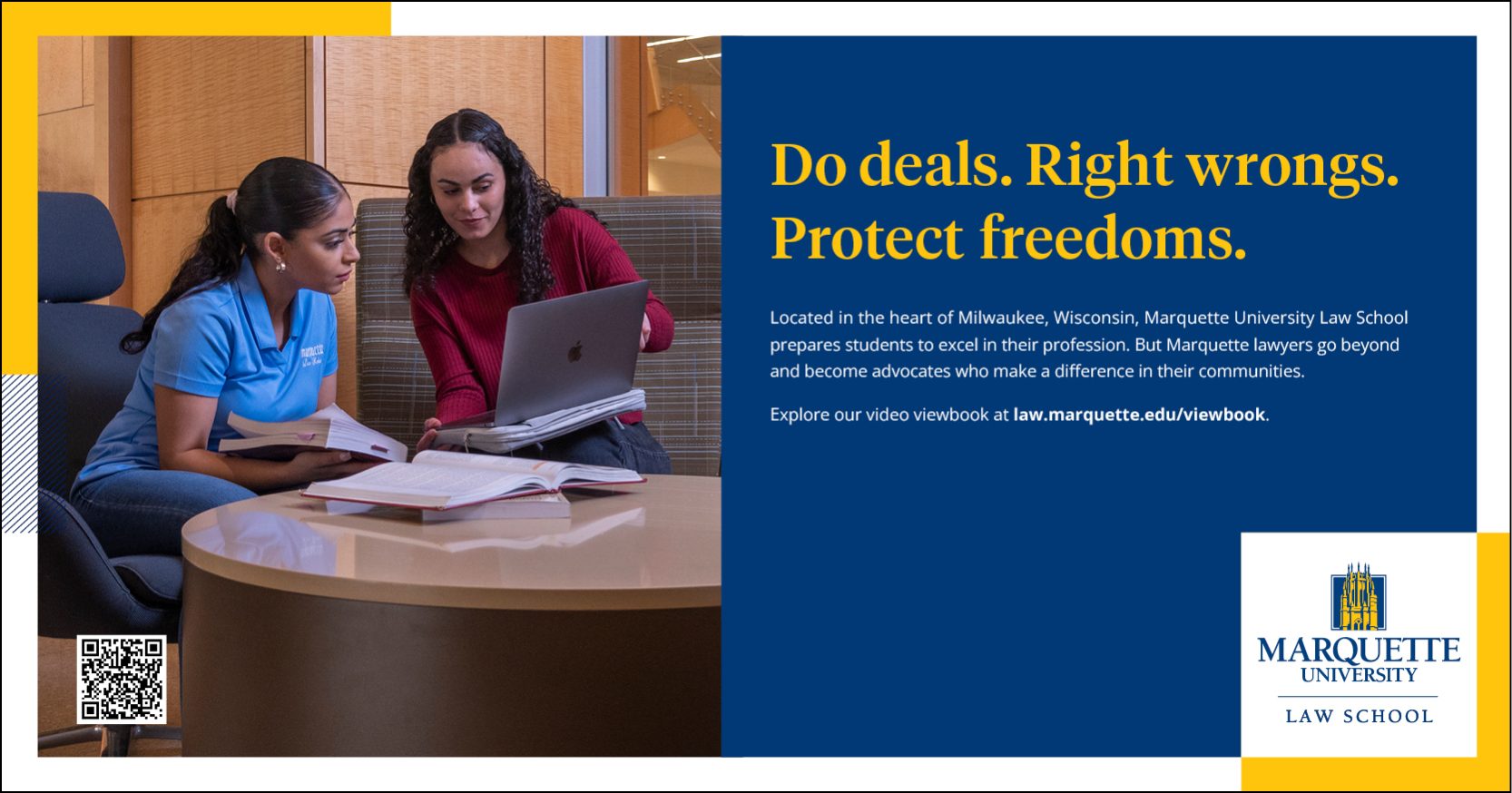
Marquette University Law School
Going Above and Beyond
One of two law schools in Wisconsin, Marquette Law is a private, Catholic law school. But it is the law school’s commitment to diversity and inclusion that shows its ATTITUDE. Annually Marquette Law:
- hosts a series for JD students on race and substantive 1L curricular areas (e.g., Contracts, Criminal Law, and Constitutional Law);
- participates in the State Bar of Wisconsin’s Diversity Clerkship Program, an initiative that places students in full-time summer employment in private law firms, corporate legal departments, and governmental agencies;
- holds the annual Marquette Lawyer/Student Diversity Reception, an invaluable networking opportunity for law students and prospective students to connect with diverse alumni and other members of the Wisconsin bar and bench; and
co-sponsors the annual Wisconsin Statewide Pre-Law Diversity Conference & Law Fair.
Visit Marquette University Law School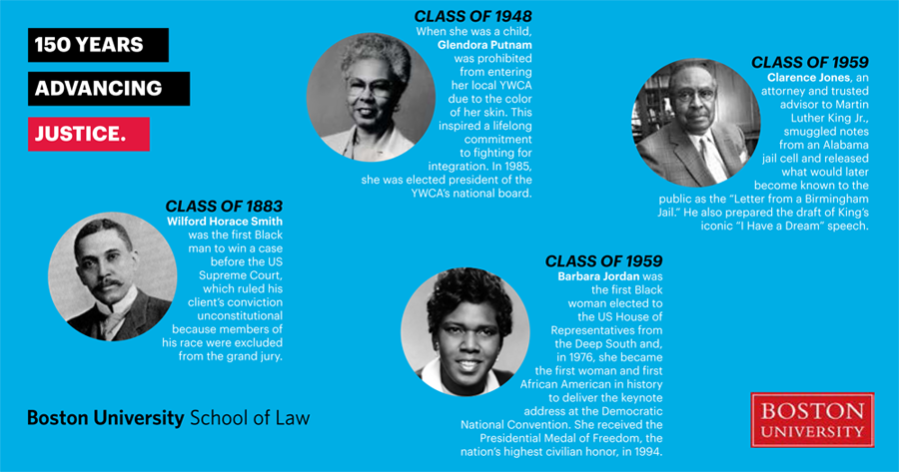
Boston University School of Law
Bold Visionaries
In 1872, less than a decade after the end of the Civil War and nearly 50 years before women won the right to vote, Boston University School of Law envisioned a law school open to everyone without regard to race, gender, or religion. Throughout the century and a half that has followed, BU Law’s alumni have served on the front lines of the fight for equality in all its forms, ever aspiring to achieve the nation’s founding promise of equal justice under the law for all people. Boston University Law’s commitment is steadfast; the work continues.
Visit Boston University School of Law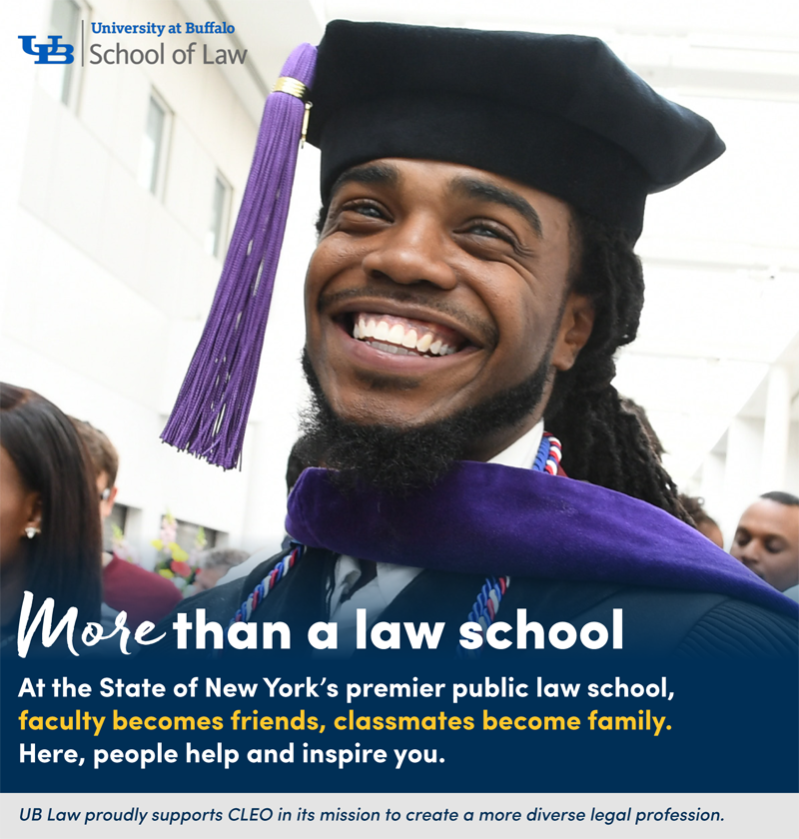
The University at
Buffalo School of Law
Where Everybody Belongs
The State University of New York system’s only law school, Buffalo Law is committed to providing an environment where students, staff, and faculty from underrepresented groups excel personally, academically, and professionally.
The 131-year-old law school offers programming and support, such as tailored enrollment events, annual celebrations, and mentorship opportunities to develop relationships with students from traditionally underrepresented backgrounds. The goal is to cultivate and maintain a diverse and inclusive law school where everyone shares a sense of belonging. The University at Buffalo School of Law students graduate practice ready, with less debt, and surrounded by a loyal community striving for a future where the legal profession reflects the world around us.
Visit University at Buffalo School of Law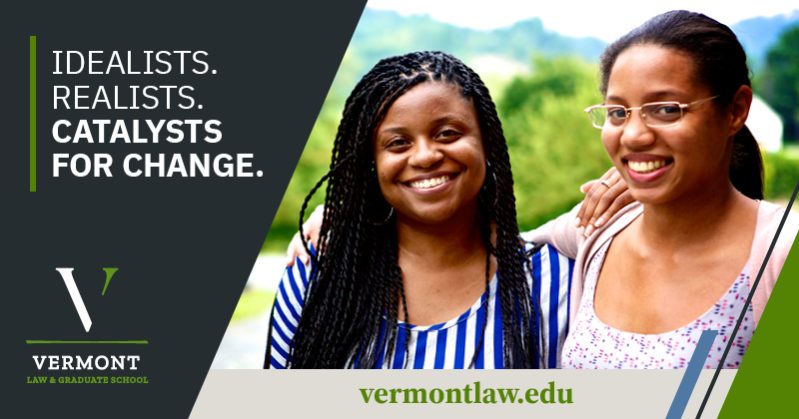
Vermont Law And Graduate School
What's In A Name?
The Green Mountain State’s only law school recently changed its name and focus to include a graduate school. Vermont Law and Graduate School’s (VLGS) concentration will “reflect the growing interest from students for cross-disciplinary approaches to social justice and an all-in commitment to public interest law and policy.” VLGS’s commitment to diversity and inclusion was even more magnified by elevating Shirley Jefferson to Vice President for Community Engagement and Government Affairs. Jefferson who previously served as Vermont Law’s Associate Dean for Student Affairs and Diversity was instrumental in creating CLEO’s CLIC Program at the law school.
Declaring it to be an exciting time at VLGS, Jefferson stated: “…our mission to use law, policy, and leadership to confront some of the world’s most complex challenges has never been needed more than right now. Connecting our students, faculty members, and initiatives with community leaders, elected officials, and on-the-ground activists is essential to overcoming the many issues our society faces….”
Jefferson is the school’s first vice president of color.
Visit Vermont Law and Graduate School
CLEO, Inc. is proud to include many of the nation's premier law schools in our Consortium on Diversity in Legal Education.
PARTNER LAW SCHOOLS
Boston University School of Law
Loyola University New Orleans College of Law
Marquette University Law School
Penn State Dickinson Law
Quinnipiac University School of Law
UConn School of Law
University of Idaho College of Law
The University of Mississippi School of Law
University of New Hampshire Franklin Pierce School of Law
Vermont Law School
Washburn University School of Law
SUPPORTING LAW SCHOOLS
Brooklyn Law School
Case Western Reserve University School of Law
Cornell Law School
Golden Gate University School of Law
New York Law School
St. John’s University School of Law
St. Thomas University College of Law
South Texas College of Law Houston
University of Buffalo School of Law
University of North Carolina School of Law
SUSTAINING LAW SCHOOLS
Baylor Law School
Florida International University College of Law
University of the Pacific McGeorge School of Law
Mercer University School of Law
Michigan State University College of Law
New York University School of Law
Oklahoma City University School of Law
University of Richmond School of Law
Southern Illinois University School of Law
The University of Chicago Law School
University of Denver Sturm College of Law
University of Pennsylvania Carey Law School
USC Gould School of Law
The University of Tulsa College of Law
Washington and Lee School of Law


